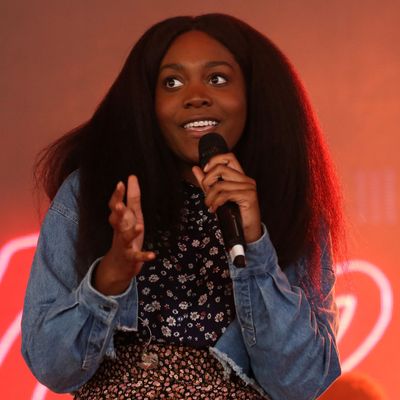
Making it as a rapper used to be a game of gaining enough people’s attention to eventually woo a major label into an advance, but enough horror stories exist in the field of mainstream rap now to give new young artists pause. Rappers under 30 are rewriting the path to hip-hop stardom at every stage, from budding talents like Doja Cat luring listeners into her catalogue through novelty songs and quirky Instagram Live streams to Rae Sremmurd pushing “Black Beatles” to the top of the charts with a viral video challenge to Chance the Rapper cutting out the middleman by leasing Coloring Book directly to Apple Music. The Chicago rapper Noname is running an indie-rap career in the classic sense. Since gaining notoriety from standout appearances on peers’ records like Chance’s “Lost” and Mick Jenkins’s “Comfortable,” Noname has funded the recording of her own records and funneled money from tours back into furthering her career.
Noname attacks words with the vibrant, conversational tone of a spoken-word poet with impeccable timing, thanks to time spent around YOUmedia, the Chicago teen “learning space” and meeting ground whose fertile list of rap alums (Chance, Noname, Saba, Vic Mensa) brings to mind the Cali open-mic space Good Life Cafe, whose success stories include Jurassic 5 and the veteran indie-rap collective Project Blowed. Noname’s music sounds warm, quiet, and inviting in part because of the soft tone of her voice and her background in poetry, but it also comes out that way because embellishments cost money. Both her 2016 debut Telefone and this month’s new Room 25 are short, sweet reflections couched in live instrumentation provided in large part by her producer pal Phoelix. Keeping things small keeps them affordable, but Noname’s evocative, confessional lyricism means they never seem slight.
Room 25 is the one where the rapper makes a splash and moves to Los Angeles, as a number of young creatives have in the last four years, ideally to bask in steadier weather and legal weed. (Noname lives in South L.A. now, and as per a recent Fader profile, she’s found a good dispensary.) A city’s reputation never tells the full story. In the same way that Acid Rap, The Water[s], and Telefone reminded out-of-town rap fans there was more to Chicago than death and drill music, Room 25 zeroes in on the grit underneath Los Angeles’ polish. “L.A. be bright but still a dark city,” she raps wryly in “Prayer Song.” “So come get your happy and your new titties.” “Don’t Forget About Me” hews darker: “Welcome to Beverly Hills / Welcome to Vicodin, I took those pills.” “Blaxploitation” excoriates Hollywood and hip-hop for typecasting black women as silent maids, long-suffering mothers, and video vixens.
In an industry hung up on appearances, Noname’s chief concerns are love, acceptance, and survival. Room 25 dives into sex and relationship matters with the same caustic wit that spices her politics, sailing an empowering smirk back at rap’s unblinking male gaze. “Self” is a sex rap delivered like a taunt: “Fucked your rapper homie, now his ass is making better music / My pussy teaching ninth-grade English / My pussy wrote a thesis on colonialism.” “Montego Bae” and “With You” pine for lasting physical and emotional connection, but “Window” skewers an ex who blew it: “The way you struggling to love yourself, believe me, that’s karma / You want a nasty bitch psychiatrist that cook like your mama.” Like Cardi B’s “Be Careful” or SZA’s “Drew Barrymore,” Room 25 delves into what mistreatment by a significant other can do to your self-worth. It’s a reminder that selfish, inconsiderate behavior doesn’t happen in a vacuum.
Arrangements keep what ought to be an unconventional record sounding too familiar. The production lands on a plush neo-soul vibe early it rarely shakes. The smooth, spectral keys of “Prayer Song” and the busy bass of “Blaxploitation” are nice touches. (Give the latter points for pulling samples from Rudy Ray Moore’s Dolemite and Sam Greenlee’s controversial revolutionary novel and film The Spook Who Sat by the Door, which is long overdue for some kind of ghoulish Spike Lee redux.) But when “Don’t Forget About Me” stops and jokes, “Somebody hit D’Angelo, I think I need him on this one,” you realize the lick owes its life to the delicate Charlie Hunter and Pino Palladino grooves of Voodoo. Sometimes well-trod soul grooves and motivational yarns make the whole thing run a little too cloying, like “Window” advising to “Quit looking out the window, go find yourself.” Noname is making quality music, cutting out overhead, and recording with a skeleton crew, but it’s hard not to wonder what she could do with a bit more budget.


